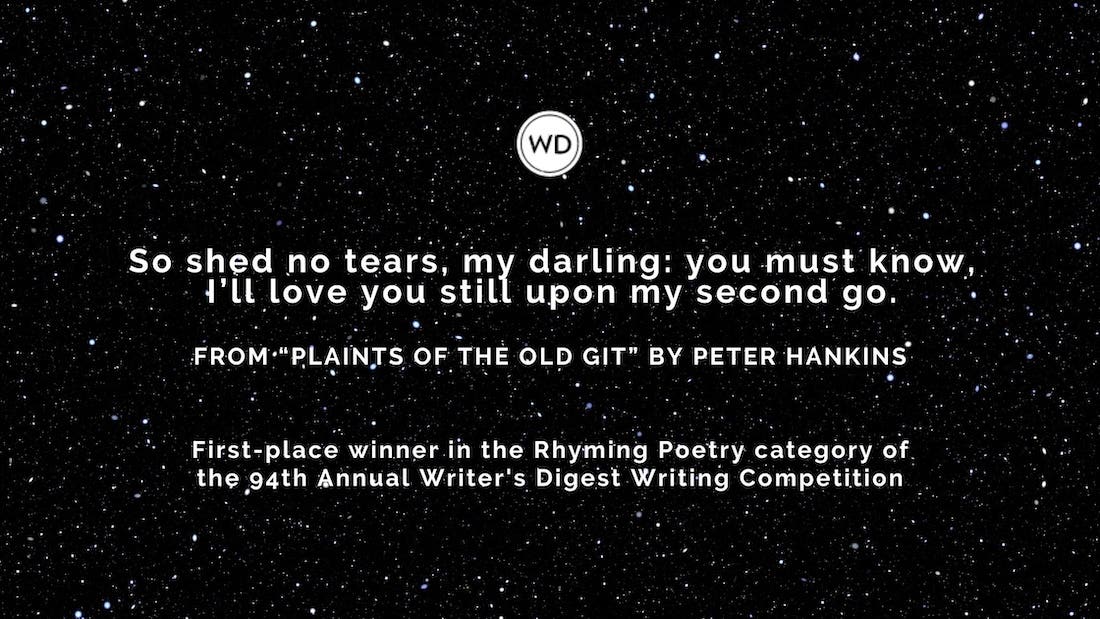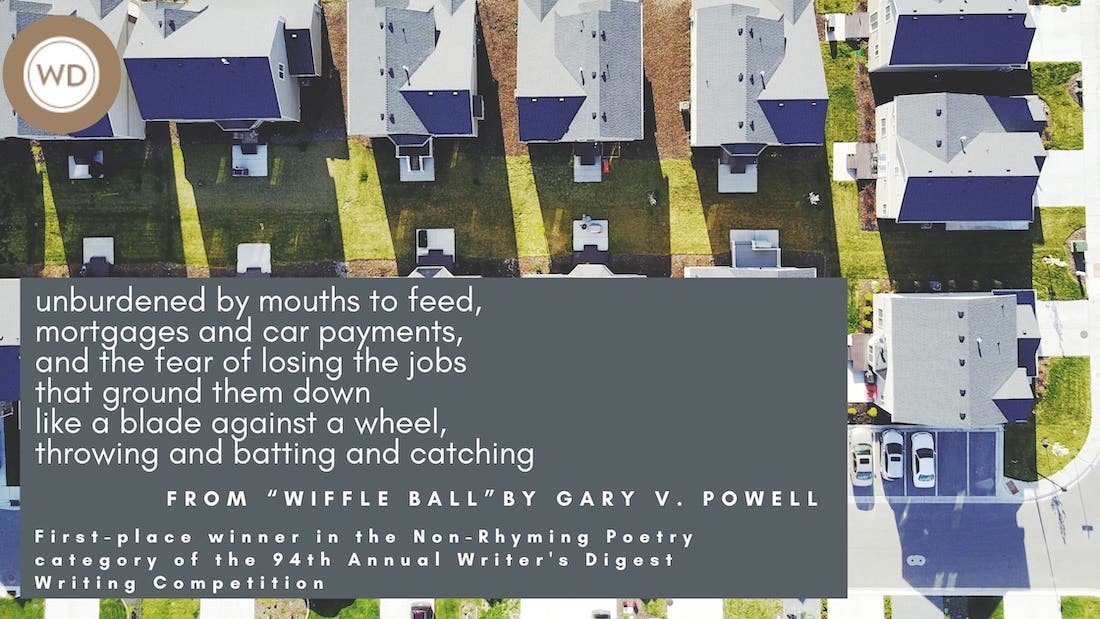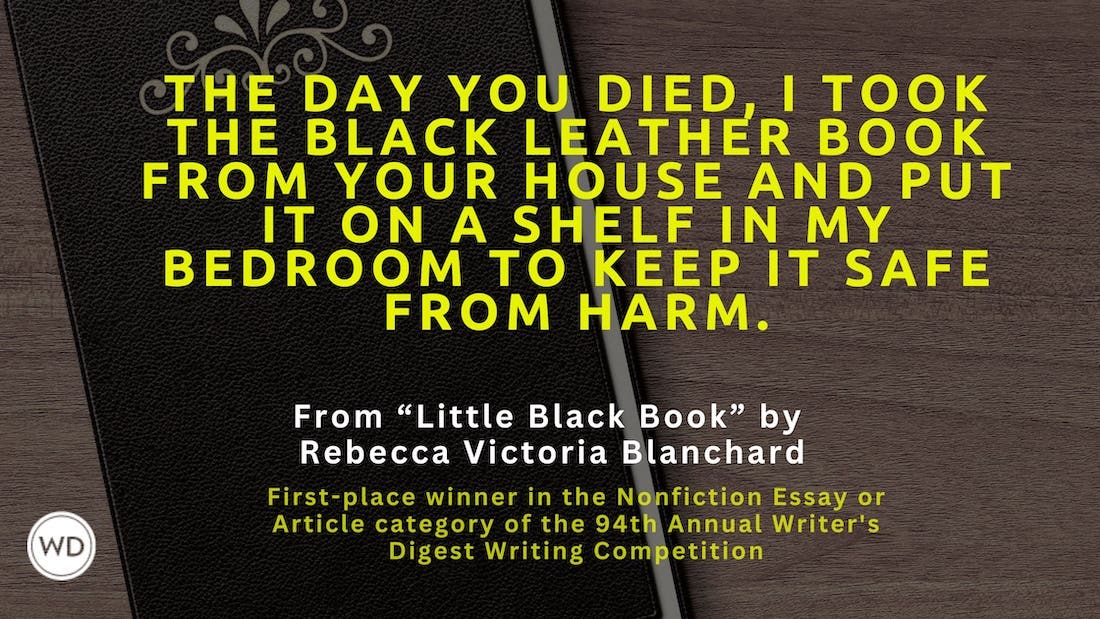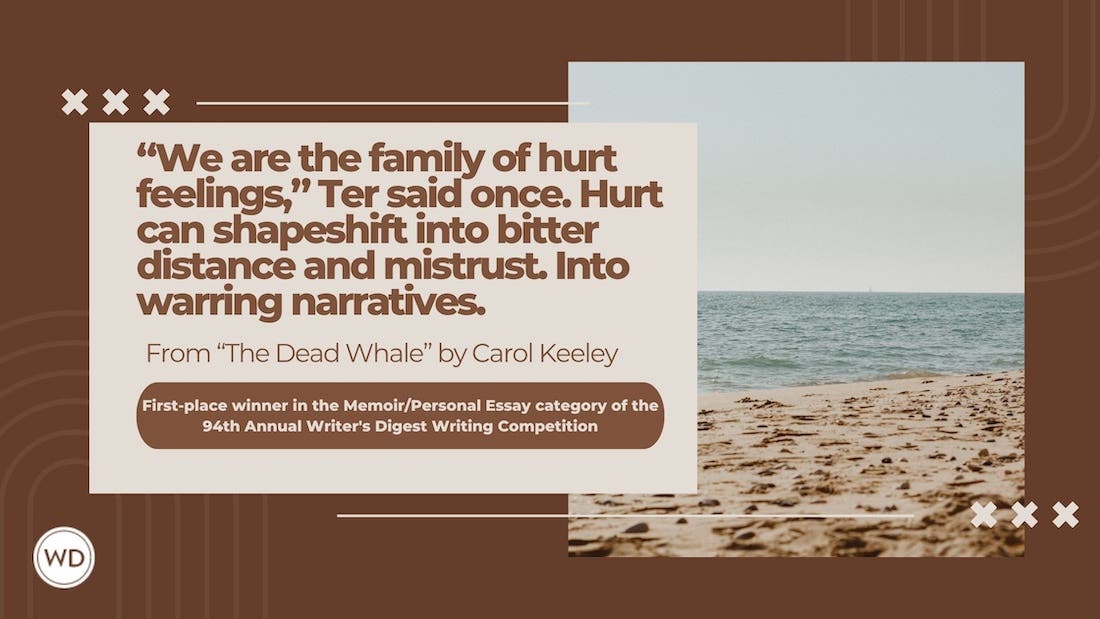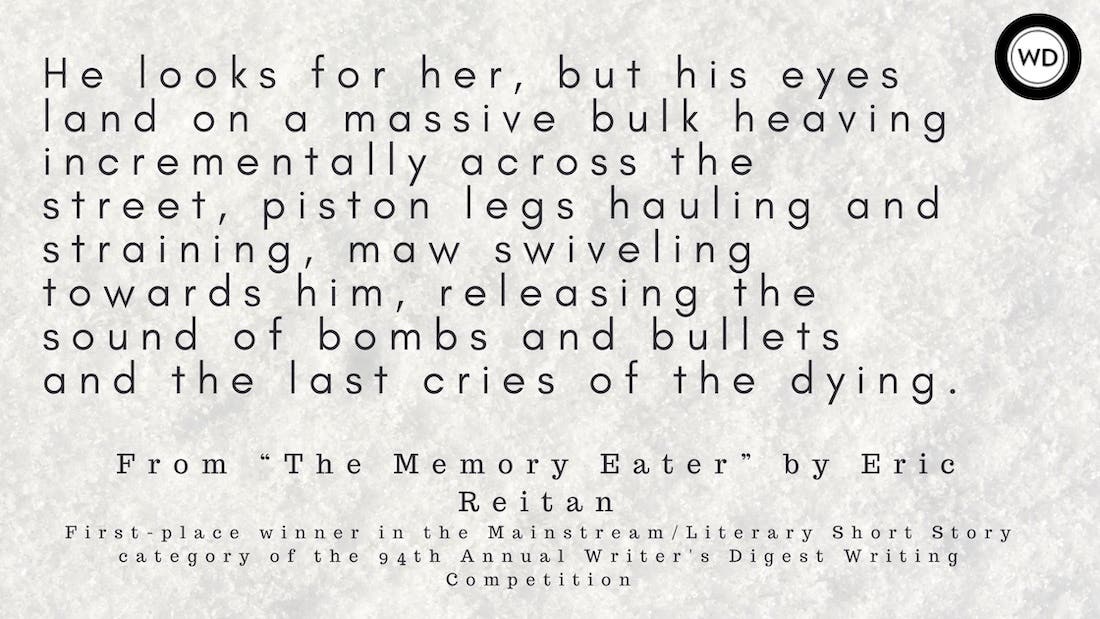Writer’s Digest 92nd Annual Competition Nonfiction Essay or Article First Place Winner: “Batgirl’s Last Ride”
Congratulations to Nancie Erhard, first-place winner in the Nonfiction Essay or Article category of the 92nd Annual Writer’s Digest Writing Competition. Here’s her winning article, “Batgirl’s Last Ride.”
Congratulations to Nancie Erhard, first-place winner in the Nonfiction Essay or Article category of the 92nd Annual Writer's Digest Writing Competition. Here's her winning article, "Batgirl's Last Ride."
Batgirl's Last Ride
by Nancie Erhard
It looks like a solid brick wall but wait—are those cracks? A secret exit reveals itself, swinging down like a drawbridge. Out zooms a masked girl riding a motorcycle, her cape billowing away from her shoulders like wings. It’s Batgirl!
I narrated the scene and sang the theme song music to myself, Nah-nah-nah-nah-nah-nah, as I hit the pedals and scooted out of the carport. There was no secret exit because there was no real wall, and it was a girl’s blue Schwinn bike instead of a motorcycle, so I had to make my own Vroom, Vrooms. With a glance to be sure that no cars were coming, I barrelled full speed down the short driveway into the street. I had to get away from the house as fast as I could so no one could guess my secret identity. Especially not Jan. I pedaled in the opposite direction from her house.
I had cobbled together Batgirl’s disguise: a leotard on which I’d stuck the bat symbol cut out of yellow contact paper, plus tights, a scalloped cape from an old skirt, a headband to which I attached little bat ears, and a dime-store mask. Halloween was over, but I wore this getup outside anyway. Jan would have looked at me from bat ears to sneakers, sniffed, and said something like, “Well, look at you! But aren’t you a little old to play dress up?” The girls who buzzed around her like flies around spoiled fruit would snicker behind their hands. I wouldn’t be a teenager for a few months yet, but I guess my Batgirl disguise would seem childish to someone who already wore a bra and makeup, shaved her legs, and taped up her school uniform hem well above her knees. It would be childish, that is, if I were playing dress-up.
Was Yvonne Craig playing dress-up in her role as Barbara Gordon/Batgirl? Or Nichelle Nichols as Lieutenant Uhura, the only female with a speaking role on the crew of the starship Enterprise? I wasn’t playing dress up, I was rehearsing, no—doing improv. It was too bad that I didn’t have anyone to do improv with anymore, the way I did in the drama class I went to on Saturdays last year. But why should I let that stop me? I could at least imagine I was part of a Dynamic Trio.
Batgirl didn’t wait for an invitation. She dared to insert herself and prove her worth, even rescuing a captive Batman and Robin, more than once. Batgirl didn’t need superpowers, just her brain, an impressive kick, and some clever technology, like a compact with a laser beam, to cause some “delightful, dynamic, destruction!” for the bad guys. Sure, the live-action TV version of the comic books (with its ridiculous villains and WHAMs and POWs in the fight scenes) was silly, but I loved its wordplay.
Jan would not be impressed. Before she arrived, with the exception of Geri’s cousin, the girls in my class had known each other since kindergarten. We weren’t saints; there were squabbles and hurt feelings. But nothing cruel. I was the first to sit next to Jan and talk to her, to make a new girl feel welcome, but she soon pronounced me “too dorky.” And her comments about others had me noticing things I never gave a thought before like how greasy Geri’s hair was— “Gross. Hasn’t she heard of shampoo?”—or that Annie wore orthopedic shoes. We went from all being “us” to “us” and “them,” “in” or “out,” in a matter of weeks.
The mission I had invented for Batgirl was rescuing my older brother. He’s listed as Missing in Action, the narrator intoned, this time with Walter Cronkite’s voice in my head. He could be wounded, a P.O.W.—or worse. The voice changed to Batman’s narrator. What’s this? Batgirl is going behind enemy lines? Holy Hanoi, what are you thinking, Batgirl?
My brother wasn’t missing in action. He hadn’t even been drafted. But it could happen soon. He had made it into junior college, and under the old rules, he would have had a deferment. But they changed to a lottery system. They said it would be fairer, and for people born in his year, the lottery would happen next summer. Even though I’d conjured this rescue scenario for Batgirl, I couldn’t picture him—his gymnast’s build, high cheekbones, sharp jawline, and warm amber eyes—shorn of his thick, collar-length brown hair and dressed in a uniform.
I didn’t have to imagine hostile forces in the neighborhood. For as long as I could remember, the favorite game among the boys had been War. Girls were banned from the game except as targets, so it was never clear to me which side was which, how the players could tell who won, or even knew when the game was over. It didn’t seem to end. Batgirl knows where nests of snipers might be lurking, so she has to choose her route carefully. My eyes darted to the known bivouacs of garbage cans and hedges; I was ready to divert or abort at any sign of an ambush. I flew down one hill and made it up the next where I turned into a cul-de-sac, the street where my current crush lived, just in case I could glimpse him.
“Finding” my brother wounded but alive, I imagined Batgirl freeing him. I could almost feel him holding onto me as he rode on the back of Batgirl’s motorcycle while, evading ambush again, she brought him home.
Over the winter, my brother moved in with some friends, but he still came home regularly. He was a math whiz and good at sports, both things that were not my strengths. But he struggled more than I did with writing, and sometimes he asked me to look over his papers before he handed them in, to check his spelling and grammar. He was cool enough to ask for help from a little sister. Most guys would be too stuck up.
College seemed so much more interesting than seventh grade. Except Miss Slama’s class. Four days a week we studied history—this year it was the American Revolution—but on Fridays, we put the desks in a circle and discussed current events. We studied popular song lyrics alongside Time and Newsweek, and we were supposed to watch the evening news. I did that already. I would sit on the floor in front of the TV. Along with my heated-up frozen pizza, fish sticks, or Swanson TV dinners, I ingested images of a river on fire in Cleveland, the atrocities at My Lai, napalm explosions, police attacking protesters.
That winter I turned thirteen, and by the spring the war had breached a border. Soldiers shot college students like my brother, at a protest in Kent, Ohio. Four died. A girl knelt on the pavement beside one of them with her arms outstretched, pleading. She was just a year older than me. She looked a bit like me, too.
My brother had marked my becoming a teenager by taking me to the concert of my choice as a birthday gift. From the concerts available, I chose to see Neil Diamond. To my surprise my brother enjoyed the show. We didn’t always agree on things.
In fact, we argued a lot. By this time our arguments had evolved into something more than sibling fights over who would get the last piece of chocolate cake. When Miss Slama had us hold a mock debate over the American Revolution, as if we were alive at the time, I realized that’s what my brother and I were doing. We were debating. It could be about almost anything, from what he wrote in his college papers to whether or not Bob Dylan was a genius. He said, “Listen to Beethoven’s Fifth. That’s genius.” I had to admit he was right about Beethoven, but that didn’t make me wrong about Dylan. My brother would never let me get away with arguing for or against something based on emotion. I had to have solid reasons. He was all for logic, like Mr. Spock. (I watched Star Trek because he liked Star Trek.) Unlike anyone else in the family, it mattered to him what I thought. Deep discussions didn’t happen with my parents or sisters, ever.
One topic we never touched, though, was the war.
I wanted to ask him about it, to know where he stood, to discover what I thought as we slammed questions around. Is there a time for war? Or was it, as the song said, good for “absolutely nothing?” Surely some things were worth fighting for—human rights, freedom, defending the innocent and weak. But was that what we were doing? Were we fighting for something worth sending my brother? I knew I couldn’t raise such questions without getting swamped by feelings. I couldn’t put out of my head the images of dead women and children and old people in trenches, of thatched huts set ablaze with flamethrowers, jungles turned black with poison. Our soldiers did this, not an enemy. I couldn’t even whisper it: What if we were the bad guys?
We inched closer to Lottery Day. One night, I heard my brother’s Volkswagen put-put into the driveway, so I started down the hall to see him. I heard him say hi to Dad, who must have been sitting at the kitchen table with his beer and cigarettes, rather than in his recliner, waiting.
Dad didn’t say hi. Without any preamble, he said, “Son, if you’re called and you don’t go, don’t come back. You don’t have a home here.”
I froze and retreated.
My brother had always looked up to Dad. As the only two males in the household, they shared something my sisters and I weren’t part of. I thought they were a team. I imagine my brother did, too, until that moment.
The lottery took place on a Wednesday. My brother wasn’t home; I didn’t know where he was. I was relieved I could watch it on TV—ABC carried it nation-wide, live—without him in the room. Men in suits rotated and rotated two big drums, like bingo. One drum had capsules with the dates of the year, the other the numbers 1-365. They drew a capsule from each drum, and young men with that birthdate would have the corresponding number assigned; the lowest numbers would be the first to be drafted. The news said that “youths” with numbers below 124 were sure to be called up, but also that the White House estimated the cut-off number could go as high as 245. When they drew my brother’s birthday, I hid my face in my hands and peeked through my fingers.
251. My brother was safe.
But it was only a matter of luck. Other families weren’t so lucky.
I never rode out as Batgirl again; the leotard and tights got too small. Besides, both Batman and Star Trek had been cancelled. I didn’t care. They felt repetitive. Here’s another brawl with clownish villains and their thugs; there’s one more battle with the Romulans. I longed for a different kind of story, but I couldn’t have said what that was.





